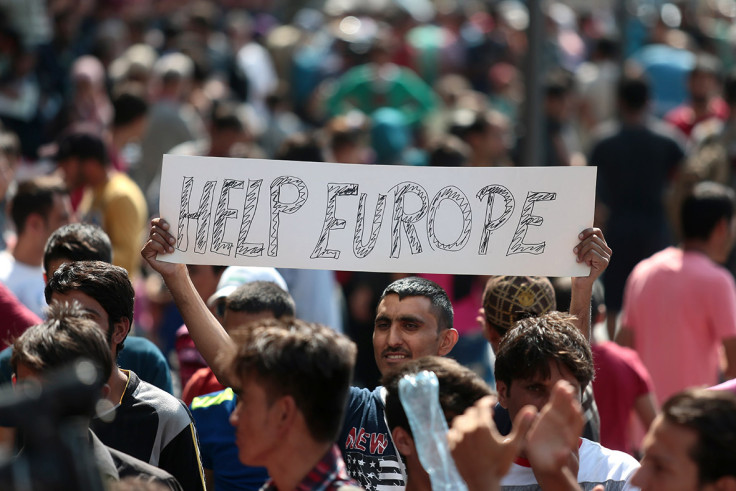Migrants crisis: Grass roots #RefugeesWelcome campaign takes Britain by storm

As the image of drowned three-year-old refugee Aylan Kurdi was shared around the world, British public opinion towards the thousands of refugees and migrants braving the dangerous journey from their often war-torn homes to Europe appeared to shift.
The hash-tag #RefugeesWelcome was trending on Twitter late Thursday with 74,000 tweets over the past 24 hours and almost 9,000 between 3pm and 4pm. Meanwhile, a petition launched on a government homepage calling for the UK to take in more asylum seekers from war-torn countries such as Syria had attracted over 200,000 signatures on Thursday.
The petition, launched by Katie Whyte, attracted most of its signatures in the past 24 hours, easily doubling the 100,000 threshold for it to be debated in parliament.
Even The Sun, which recently printed an opinion piece by columnist Katie Hopkins comparing refugees to cockroaches, called on Prime Minister David Cameron to deal with the "heart-breaking life and death situation" that has seen 2,300 refugees drown in Mediterranean this year.
Both David Cameron and chancellor George Osborne seemed unmoved by this groundswell of support for refugees in Britain in recent days, with the PM sticking to his view that the country could not accept more people and Osborne blaming the deaths on Islamic State (IS) and human trafficking gangs.
But images of desperate refugees in Hungary being shut outside Budapest's central train station and more stories about migrants and refugees lost at sea – not to mention the tragic case of Aylan Kurdi and his family – have only served to highlight how little Britain is doing to solve the migrant crisis.
Acting Labour leader Harriet Harman has written to Cameron to argue that Britain has a moral duty to take in more refugees, while shadow home secretary and leadership hopeful Yvette Cooper said that UK should take 10,000 more refugees.
But it is at the grass roots level that the pro-refugee argument was being made so forcefully in the wake of the Kurdi images. Not only was Whyte's petition trending on Twitter but a number of other Facebook and Twitter groups were springing up online.
Writing on her Facebook page, Whyte said that she did not accept that the anti-refugee rhetoric in recent weeks represented British public opinion.
"I keep hearing how people who want to help refugees in Britain are in the minority but I don't believe this. There are thousands of British people currently sending what aid they can and support is increasing day by day. I know that people have different opinions but I think that compassion will win through," she wrote on 30 August.
One other prominent campaign was the #RefugeesWelcomeEFL group, which called for English Premier League clubs to unfurl banners at football games across the country on September 12, when the league returns after the break for international play-offs this weekend.
Within hours of being launched, the campaign had received support from fans of Charlton, Swindon and Aston Villa, with the Premier League side's supporters pledging to fly a banner in support of asylum seekers at the club's next game away at Leicester.
Props RT @RefugeesEFL: We have our 1st Premier League club! Aston Villa fans will put up a (cont) http://t.co/SwNd312u9k
— ANE (@anaustra) September 3, 2015Swindon fans have beaten their fundraising target for their #RefugeesWelcome banner away at Barnsley in just hours. http://t.co/fttOiiQtMh
— #RefugeesWelcome EFL (@RefugeesEFL) September 3, 2015It follows a similar campaign in Germany, where banners carrying the message: "Refugees Welcome" were seen at games on 29 August, where just a few days earlier Borussia Dortmund invited 220 refugees to watch their Europa League tie against Norwegian club Odds Ballklubb, according to i100.
Other prominent figures including footballer Lukas Podolski, Daimler boss Dieter Zetsche and Nobel-winning writer Herta Muller have also rallied against refugee hate in a seven-page spread in tabloid Bild.
It also ran an editorial from Muller called: "I was also a refugee", recounting how thousands of Germans fled from the Nazi regime. "Everyone who fled into exile from the Nazis was saved... Germany must do what other countries had done earlier for the Germans," she wrote.
More banners at football stadiums in #Germany
What's up in your country? pic.twitter.com/wVsnYC7Pvi
— Mark (@markito0171) August 30, 2015© Copyright IBTimes 2024. All rights reserved.







